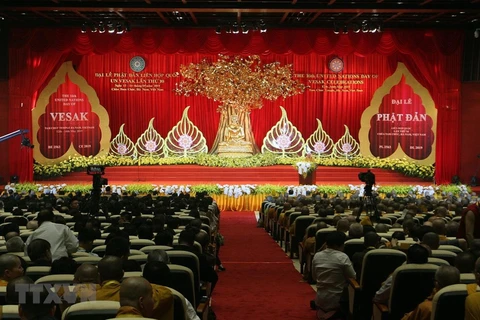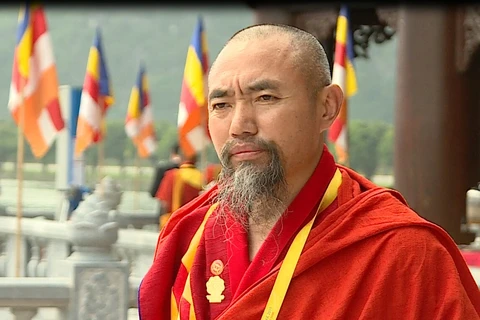 Scholars, delegates and Buddhist dignitaries discuss mindful leadership for sustainable peace (Photo: VNA)
Scholars, delegates and Buddhist dignitaries discuss mindful leadership for sustainable peace (Photo: VNA) Ha Nam (VNA) – International and Vietnamese scholars, delegates and Buddhist dignitaries talked approaches to mindful political leadership to strengthen peace under Buddhist perspective at a seminar on May 13 in Ha Nam province.
During the event that took place as part of the ongoing UN Day of Vesak celebration at Tam Chuc Pagoda, participants shared their knowledge and international studies on how to train and master mindful leadership for world peace and happiness of people.
Prof. Biman Chandra Barua from Department of Pāli and Buddhist Studies, Bangladeshi University of Dhaka, said Buddhism is considered one of the major religions in the universe. It is not only a religion but also provides guidelines for people to lead a decent and peaceful way of life.
He attached significance to good governance role in every state, regions and country in order to bring happiness and peace, particularly among contemporary social injustice, wars and conflicts.
“Transparency, equity, equality, rules, and regulations need to be exercised in every aspect of life for ensuring good governance,” he said.
According to the Bangladeshi professor, political leaders who exercise ten royal virtues of Buddhism can deliver peaceful and happy governance, thus making a prosperous, happy, and healthy society of the state, regions, and countries.
“Mutual respects, relationship, accountability and transparency can be achieved through practicing ten Buddhist royal virtues. These virtues bring happiness, peace and spiritual development which are very essential for a nation,” said Prof. Biman Chandra Barua. “A country or a state could not be corrupted or unhappy if these royal ten virtues are practiced and applied in every sector of life guided by the Lord Buddha,” he added.
In his presentation, Can Dong Guo from Canadian Academy of Wisdom and Enlightenment, underlined the complexities of global conflicts, saying global leadership for sustainable peace is a colossal task for great minds.
“Traditional Buddhist mindfulness training such as various meditation techniques are designed to discipline the mind to concentrate and focus,” he said.
He described the Buddhist logic as a gold mine which is unearthed to serve as critical thinking tools, providing political leaders the necessary mindset to comprehend complex problems.
Meanwhile, Benjamin Joseph Goldstein, M.A. in Religious Studies from the US’ Naropa University, expressed his belief that leadership informed by Buddhist principles can be applied in service to deliver sustainable peace.
“There is a great deal that may be learned through applying some of the insights of Buddhist teachings to the cause of promoting healthy leadership,” he underscored.
During the event, participants also heard discussions about Buddhist orientation for leadership and sustainable peace, Buddhist approach to universal ethnics through good governance, as well as the logic and correct mindset that peace-making leaders must acquire.
The 16th UN Day of Vesak 2019 is taking place in Vietnam from May 12-14 under the theme “Buddhist approach to global leadership and shared responsibilities for sustainable societies”.
Five sub-themes are being discussed in groups on May 13, namely “Mindful leadership for sustainable peace”, “Buddhist approach to harmonious families, healthcare and sustainable society”, “Buddhist approach to global education in Ethics”, “Buddhism and the Fourth Industrial Revolution”, and “Buddhist approach to responsible consumption and sustainable development.”
This year marks the third time Vietnam has hosted the UN Vesak celebration. It brings together more than 1,650 international delegates from 112 countries and territories across the world and over 20,000 Vietnamese Buddhist dignitaries, monks, nuns and followers.
Previously, it took place in Hanoi in 2008 and the northern province of Ninh Binh in 2014.-VNA





















